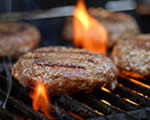 Go to main content
Go to main content
Archive Website of the UK government
Please note that this website has a UK government accesskeys system.
Main menu
Page menu
Home and community

Fire safety – barbecues, camping and the outdoors

Fire safety and prevention should not stop outside the home. Carelessness outdoors while barbecuing or camping can have fatal results. Fires can also destroy huge areas of countryside, people’s property and delicate ecosystems. Find out how to prevent fires when barbecuing and camping.
Barbecue safety
Whether you are in the garden or out camping, follow these simple tips to barbecue safely and avoid injuries or damage to property from fire:
- make sure your barbecue site is flat and away from fences, trees and sheds
- keep a bucket of water or a garden hose nearby, in case of emergencies
- use only enough charcoal to cover the base of the barbecue to a depth of about 5 centimetres (2 inches)
- never use petrol or paraffin to start, or revive, your barbecue – use only barbecue fire lighters or starter fuel on cold coals
- keep children and pets away from the cooking area
- don’t leave the barbecue unattended
- enjoy yourself - but don't drink too much if you are in charge of a barbecue
- after cooking, make sure the barbecue is cool before trying to move it
- empty ashes on to bare soil, not into a bin
Gas barbecues – additional tips
Follow these extra tips if you are using a gas barbecue:
- make sure your barbecue is in good working order
- make sure the tap is off before changing the gas cylinder and do it in the open air
- don’t over-tighten joints
- when you have finished cooking, turn off the gas cylinder before you turn off the barbecue controls – this means any gas in the pipeline will be used up
- read the manufacturer’s instructions about how to check for leaks in the cylinder or pipework, eg brushing soapy water around all joints and looking for bubbles
Storing gas cylinders
Don’t keep more cylinders than you need. Gas cylinders should be kept outside, away from direct sunlight and frost. If you have to keep them inside your house, make sure you don’t store them under the stairs. If there is a fire, they could explode and the stairs are likely to be your escape route.
Camping safety
When you are going camping, follow these basic precautions to reduce the risk of fire starting and spreading:
- before you set off, get the contact details of the local fire and rescue service
- set up tents at least six metres apart and away from parked cars
- make sure you know what the fire safety arrangements are on the camp site and where the nearest telephone is
- don’t use oil-burning appliances, like lanterns, or candles in or near a tent – torches are safer
- don’t smoke inside a tent
- place your cooking area well away from the tent
- keep your cooking area clear of items that catch fire easily (‘flammable’ items), including long, dry grass
- put cooking appliances in a place where they can’t easily be knocked over
- keep matches, lighters, flammable liquids and gas cylinders out of the reach of children
- have an escape plan and be prepared to cut your way out of your tent if there is a fire
How to deal with a fire when camping
Remember these two simple tips:
- get everyone out straight away – fires in tents spread very quickly
- call the fire and rescue service and give a map reference if possible – provide a landmark, like a farm or pub, to help them find you
How to reduce the risk of wildfires
Dry ground in the summer means there’s an added risk of a fire starting, but you should take care at all times of the year. Follow these tips to reduce the chance of a wildfire in the countryside:
- extinguish cigarettes properly and don’t throw cigarette ends on the ground – take your litter home
- never throw cigarette ends out of car windows
- avoid using open fires in the countryside
- don’t leave bottles or glass in woodland – sunlight shining through glass can start fires (take them home and recycle them)
- only use barbecues in a suitable and safe area and never leave them unattended
- if you see a fire in the countryside, report it to the fire and rescue service immediately
- don’t attempt to tackle fires that can’t be put out with a bucket of water – leave the area as quickly as possible
 Facebook
Facebook Twitter
Twitter StumbleUpon
StumbleUpon Delicious
Delicious Reddit
Reddit
